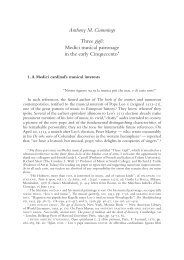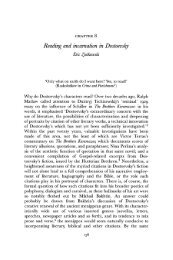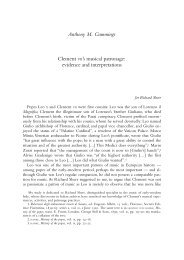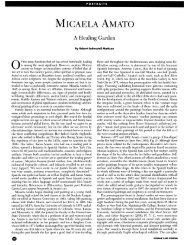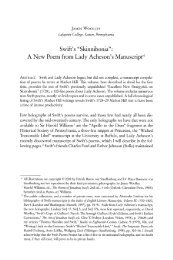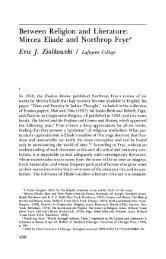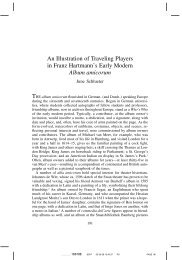courses of instruction - Lafayette College
courses of instruction - Lafayette College
courses of instruction - Lafayette College
You also want an ePaper? Increase the reach of your titles
YUMPU automatically turns print PDFs into web optimized ePapers that Google loves.
molecular biology, agriculture, and ecolo<br />
gy throughout the twentieth century will<br />
continue into the next millennium. Lafay<br />
ette's biology curricula are designed to<br />
prepare students to contribute to these de<br />
velopments by preparing them for careers<br />
in research, teaching, the health pr<strong>of</strong>es<br />
sions, and industry.<br />
Biology majors enjoy small classes and<br />
may choose from a wide variety <strong>of</strong> cours<br />
es. Special opportunities include indepen<br />
dent study and collaborative research<br />
projects with faculty, a senior honors the<br />
sis program, and paid laboratory teaching<br />
assistant positions. Non-credit internships<br />
for students considering careers in biology<br />
and the health pr<strong>of</strong>essions may be avail<br />
able through the Office <strong>of</strong> Career Services.<br />
Requirements for the major (effective for<br />
the Class <strong>of</strong> 2002 and beyond; the Classes<br />
<strong>of</strong> 1999-2001 have different requirements;<br />
consult your academic adviser or the de<br />
partment head): The Bachelor <strong>of</strong> Arts<br />
(A.B.) curriculum combines a solid back<br />
ground in biology with increased oppor<br />
tunity for the student to explore other<br />
fields <strong>of</strong> study. A.B. biology majors must<br />
take eight biology <strong>courses</strong> beyond the 101-<br />
102 level. These <strong>courses</strong> must be distribut<br />
ed as follows: two <strong>courses</strong> at the 200-level<br />
in each <strong>of</strong> the three course areas noted be<br />
low and two 300/400-level <strong>courses</strong>, one in<br />
each <strong>of</strong> two <strong>of</strong> the course areas given be<br />
low. One <strong>of</strong> the 300/400-level <strong>courses</strong><br />
must be in the lecture format and an addi<br />
tional one must carry the seminar [S] des<br />
ignation. In addition, the A.B. major must<br />
complete the following <strong>courses</strong>: Chemis<br />
try 121/122 (with laboratory), Mathemat<br />
ics 161/176,161/186, or 125/186 (Mathe<br />
matics 161/162,176 is recommended for<br />
A.B. majors planning careers in quantita<br />
tive fields; students who are unsure <strong>of</strong><br />
their degree program should begin with<br />
Mathematics 161) and a Foreign Culture<br />
unit.<br />
The Bachelor <strong>of</strong> Science (B.S.) curricu<br />
lum is broader in basic sciences and al<br />
lows the student ample opportunity to ex<br />
plore advanced areas in biology. B.S. biol<br />
ogy majors must complete 11 biology<br />
<strong>courses</strong> beyond the 101-102 level. These<br />
BIOLOGY<br />
<strong>courses</strong> must be distributed as follows:<br />
two <strong>courses</strong> at the 200-level in each <strong>of</strong> the<br />
three course areas noted below and five<br />
300/400-level <strong>courses</strong>, at least one in each<br />
<strong>of</strong> the three course areas noted below. Two<br />
<strong>of</strong> the 300/400-level <strong>courses</strong> must be in<br />
the lecture format and an additional one<br />
must carry the seminar [S] designation. In<br />
addition, the B.S. major must complete the<br />
following <strong>courses</strong>: Chemistry 121/122 and<br />
221/222 (all four with laboratory), Mathe<br />
matics 161/162/186 and Physics 111/112<br />
or 121/122. Candidates for the B.S. degree<br />
in Biology may elect a minor program in<br />
addition to their major. The requirements<br />
for a minor are the same as the <strong>College</strong> re<br />
quirements stated on p. 13.<br />
A.B. and B.S. candidates must also<br />
complete the Common Course <strong>of</strong> Study,<br />
which includes a First-Year Seminar, En<br />
glish 110, a VAST course (sophomore year),<br />
three <strong>courses</strong> in Humanities/Social Scienc<br />
es (at least one in each division) and two<br />
"writing-designated" <strong>courses</strong> (either biolo<br />
gy <strong>courses</strong> or electives), normally taken in<br />
the junior or senior year. The department<br />
does not <strong>of</strong>fer a minor in biology.<br />
Biology Course Areas:<br />
Genetics/Cellular/Molecular Biology<br />
(GCMB): 212,241, 256, 261, 302, 304, 312,<br />
362, 401-404,414,495-496.<br />
Physiology/Organismal Biology (FOB):<br />
104,201,202, 211, 213,221,225, 251, 306,<br />
308, 314,390,401404, 410,412,421, 495-<br />
496.<br />
Ecology/Evolutionary Biology (EEB): 106,<br />
218, 231, 235, 271, 332, 336, 401-404,422,<br />
495-496.<br />
101,102. General Biology. An introduc<br />
tion to the scientific study <strong>of</strong> life and basic<br />
biological principles. Emphasis is on the<br />
properties <strong>of</strong> living systems, their variety,<br />
their relationships in space and time to<br />
each other, evolution and the environ<br />
ment. Lecture/laboratory. Offered in fall<br />
(101) and spring (102) semesters. Staff<br />
104. Introductory Plant Biology. An in<br />
troduction to the principles and concepts<br />
67




